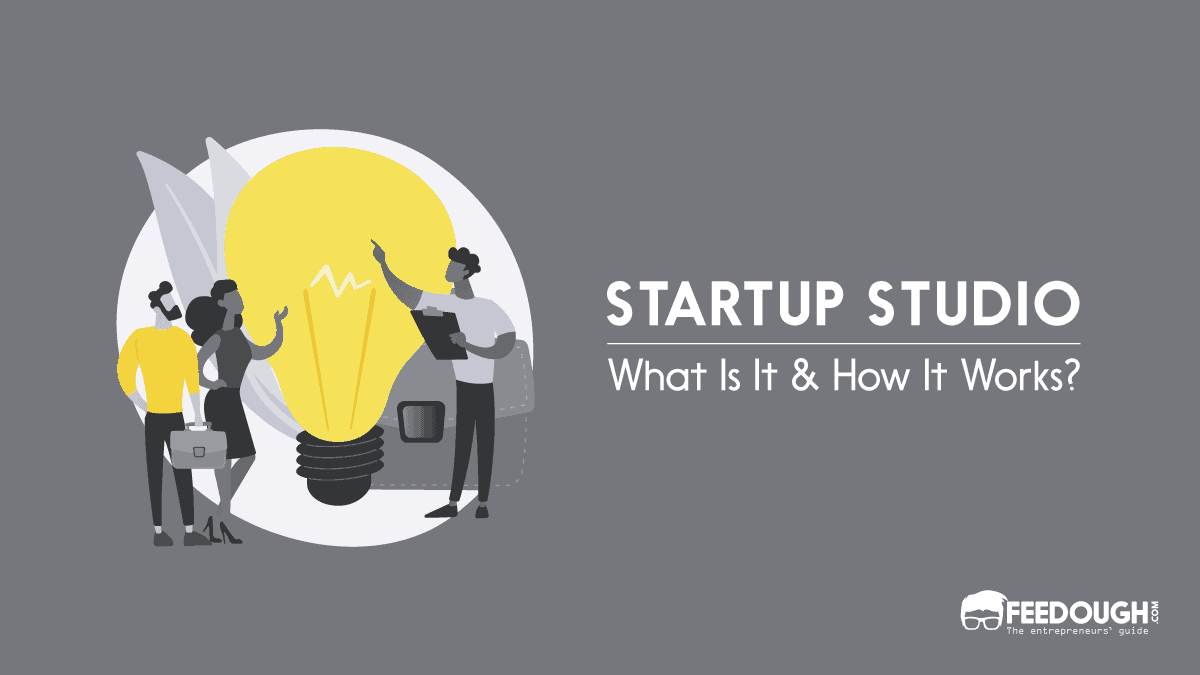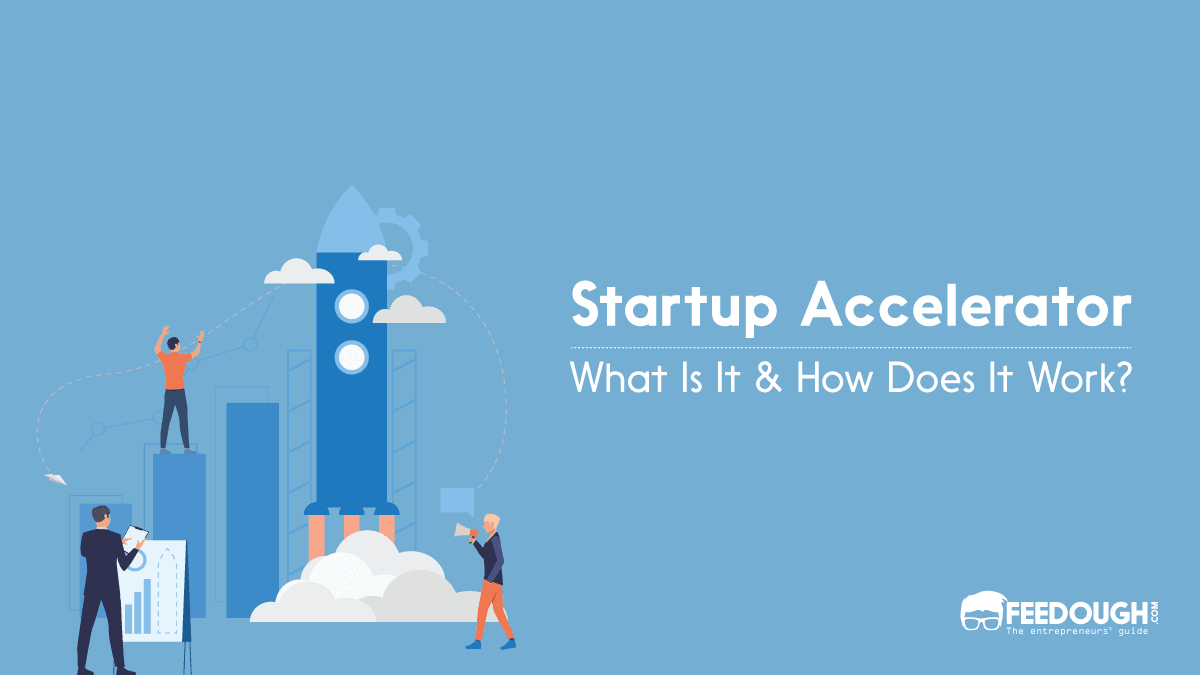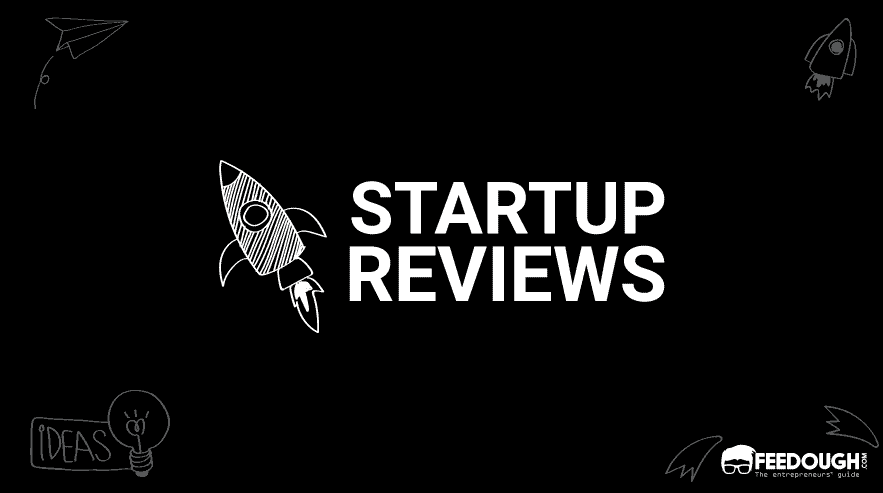The startup ecosystem is booming like never before. There’s disruption and behavioural alteration in almost every industry that you can think of.
But then, there are failures too.
However, entrepreneurs are not alone. They have enough experienced people ready to work with them, help build their startups, and reduce the chances of failures. While a majority of new founders approach accelerators and incubators, you don’t always need cohort-based entities to help you in your initial startup stages. Some businesses will partner and work with you as you need.
Yes, startup studios are such organisations. Although they have been around for a while, startup studios are often confused with an involved venture capitalist and with a funding incubator. However, it has its own identity.
So, let’s decode startup studios for you.
What is a Startup Studio?
A startup studio, also called startup foundry, startup factory, and venture studio, is an organisation that repeatedly builds businesses out of market-tested disruptive ideas using its pooled resources.
In other words, a startup studio is a startup that creates startups. It is an organisation of experienced founders, investors, and experts that either develops its ideas or partners with entrepreneurs if they have a disruptive business idea. It then utilises its pooled money, expertise, and other resources like financial capital, team, strategical plans, management processes, and technical tools to help you establish the business.
You must remember that it does not work on a cohort basis like accelerators and incubators; it will partner with you just like an investing cofounder, that is, it will work with a hands-on style and expect equity in return.
However, you might not be the only founder it is working with. The startup studio might be developing several ideas and businesses simultaneously, a style of building businesses called parallel entrepreneurship. Here, yours and the other businesses are known as subsidiaries of the studio, while the studio itself is known as a holding company.
Just like other stakeholders, the startup studio mostly exits from your business when it is acquired or when you go public.
Startup Studios vs Startup Incubators vs Startup Accelerators
Since startup studios provide capital and expertise to young startups, they are often confused with startup incubators and startup accelerators. However, you must understand that all these organisations are entirely different.
While incubators and accelerators are cohort-based training and mentorship programmes, startup studios partner with individual businesses and work in the cofounder capacity; that is, they get involved in their day-to-day working. This is why they also demand huge equity in return for their services (30-60% compared to accelerators’ 7% and incubators’ no equity). Also, accelerator and incubator programmes last for a specified duration, whereas startup studios build startups from scratch and stay with them till they exit.
The stages at which you may join these programmes also differ. Incubators take in very early-stage startups when only the idea is ready, while accelerators expect a dedicated team, ideal MVP, and good traction. A startup studio’s work depends on its operating model; it may partner with an entrepreneur who just came up with a catchy business idea or the whole team when their management plan is ready. However, it usually focuses on building companies from the ground up.
Basis | Startup accelerator | Startup Incubator | Startup Studio |
|---|---|---|---|
Purpose | Accelerates the growth of startups | Assists in conversion of ideas into businesses | Actively builds and scales up startups |
Model | Cohort-based | Cohort-based | Partners individually |
Provisions | Structured training, networking, coworking space, and capital | Infrastructure facilities, mentorship, and networking | Funding, human capital, strategic processes, technical tools, and all internal resources |
Stage of joining | Usually, after the team, plan, and MVP are ready | After a valid idea is ready | After a catchy idea is ready |
Working time frame | Three to four months | From start to when they start sustaining themselves in the market | From start to exit |
Run by | For-profit organisations like established businesses and investment firms | Not-for-profit organisations like academic and government institutions | Serial entrepreneurs and corporations (for profit) |
Raising funds | Yes | No | Yes |
Equity | Around 7% usually | No equity | Around 30-60% usually |
Ease of joining | Difficult | Easy | Difficult |
Startup Studio vs Venture Capitalists
Startup studios and venture capitalists fund and guide several companies simultaneously and demand equity in return for these services. However, you must understand that their work and goals are different.
While a venture capitalist plays the role of an investor, startup studios are more like investing cofounders. Besides providing money and guidance, they get fully involved in business operations, just like your how co-founding team would do.
Also, they have various tried and tested tools collected through past experiences of building companies which they offer to founders, whereas VCs only fund, guide, and help them with networking. Although quite a lot of VCs have entrepreneurial experience, it is very much limited to top-tier VC firms. While 58% of the general partners from top VC firms have been entrepreneurs before, only 28% of other firms’ GPs have found companies.
Venture Capitalists | Startup Studios | |
|---|---|---|
Nature | Investors | Entrepreneurs |
Working time frame | Want to exit in ten years | Do not mind waiting |
Stage of joining | When the idea, team, and sometimes even product is ready | Only a catchy idea is needed |
Characteristics of a Startup Studio
Who, why, when. Since startup studios are still pretty much new, it isn’t easy to understand and separate them from the other organisations. To make this clearer, just know that they have the following distinguishing characteristics:
- Startup studios usually work from ideation to the exit of startups; that is, they build from the ground up.
- Startup building is a repetitive process for them. They build multiple prototypes, business models, products, and companies simultaneously or in quick succession.
- Startup studios develop their internal infrastructure in due course. They have management know-how, data, technical tools, and organisational strategies tailored through their past experiences, and they keep adding to this infrastructure.
How Does A Startup Studio Work?
Experienced entrepreneurs, professionals, and industry veterans generally establish startup studios. Sometimes, large corporations start these studios to efficiently invest their existing capital structure, business processes, and expertise into building companies that might benefit their projects and consolidate their position in the industry.
They usually follow the following five steps:
- Ideation: Startup studios’ teams select new problems to solve every day. They brainstorm, ideate, and come up with disruptive business ideas around the subjects at hand. Sometimes, they also take ideas from outside entrepreneurs and deliberate with them.
- Validation: Once they have decided on the ideas, they check their feasibility and scalability by conducting market research and running several pre-designed tests on them. Most studios have developed internal screening mechanisms that efficiently strain out all the unsuitable ideas. If an idea passes the test, it is validated and can be worked on. If not, studios either drop it or return it to the founder it came from and explain the reason. Also, since there is no innovation bias involved, dropping the idea is easier than it is in regular startups.
- Creation: Now, the startup studios have to convert the validated ideas into working businesses. So, they develop prototypes and make improvements in them by leveraging customer feedback. At this stage, they also formulate business plans. However, if they fail, they either need to start the ‘creation’ step again or drop the idea.
- Spinning out: When the startup studios succeed in creating the businesses, they let them spin out and work under their own executive and support team. These teams may be a part of the studio or hired from the outside, depending on the situation. However, in the case of corporate startup studios, the executive teams are usually a part of the studios’ internal team.
- Scaling-up: Now that the businesses are ready to work on their own, they raise funding and start scaling up. At this stage, the startup studios may be as involved as required or work as happy board members waiting for dividends or a big exit.
In exchange for all this capital, resources, and expertise, startup studios demand equity in the companies. Since they are much more involved than accelerators, incubators, or VCs, they expect more share in the businesses they help developing, that is, 30-60%. Corporate startup studios may also want these new businesses to be integrated into their project.
Startup Studios Operating Model
Startup studios’ working model can be categorised into two types based on where the idea comes from:
Builder Studios
A builder studio is the one that develops companies from internal ideas. It decides on the problem to solve, comes up with a solution, validates it, and creates a working business out of it. This business then spins off and functions under its management team as an independent startup. Some examples of builder studios are Atomic, Pioneer Square Labs, Rocket Internet, and eFounders.
Investor Studios
These studios partner with early-stage startup founders and provide them with adequate resources and expertise. In addition, investor studios are a part of the everyday operations of these businesses; they work on product development, recruitment, fundraising, marketing, PR, etc.
Each investor studio tailors to a different kind of requirements. Based on what they provide, they are of four types:
- 1st Cofounder Studio Model: When a startup studio partners with an entrepreneur who has an idea but not the required team, funds, or other resources, it is on the 1st cofounder studio model basis. In exchange for around 50% of the equity, the studio validates the idea, funds the development of the prototype, prepares market strategy, builds management plan, works on product building, prepares for fundraising, and recruits executive and support team members. The entrepreneur stays in the executive position of CEO, COO, or whatever they choose. After raising funds, the startup spins out of the studio and functions on its own. Some examples of studios that work on 1st cofounder basis are Human Ventures, Pioneer Square Labs, and Madonna Venture Labs.
- 2nd Cofounder Studio Model: Here, startup studio partners with a small startup whose team and business plan are ready but need help in carrying the venture forward. Sometimes, these startups have even created an MVP, gained traction for it, and are operating in ‘stealth mode’. So, startup studios actively work with them to build their products, execute business strategies, and fulfill other requirements. They get 35% equity in exchange for this. Some examples of studios that work on 2nd cofounder basis are Hangar, Expa, and Timeal.
- Builder Outsource Studio Model: This is when a startup studio collaborates with an early-stage startup that is ready with its team, market strategy, operational resources, and business plan but needs help in building its product. The studio works with the team to design, build, and manage the product. It is a long-term partnership and any revision, updates, or change is done by the studio itself. It takes around 10% equity in exchange for all this. Some examples of studios that work on the Builder Outsource model are Rocka, Concepter, and Spark Foundry.
- 3rd Cofounder Studio Model: A 3rd cofounder studio model is like an intersection between the Builder Outsource model and the 1st Cofounder model. It refers to the collaboration where the original startup is ready with its team, idea, vision, and network. The studio helps only with product design and development, technical assistance, marketing, PR, and technical and product support. In other words, it works like a technical cofounder and expects around 25% equity in return. Some examples of such studios are Unstuck Labs and Beeso.io.
Where does a startup studio gets its capital from?
Just like other startups, startup studio usually gets their funding from VCs. But unlike usual startups, startup studios need to have a well-experienced and renowned team that the VCs can trust. This is because these studios raise money before they come up with an offering (startup) to show to the investors.
Should You Go for a Startup Studio?
Startup studios are helpful in building, growing, and scaling one’s business. As of 2019, 35% of Idealab’s companies exited through IPO or were acquired, and 5% became unicorns. Out of 415 companies create by the top 23 by 2020, 88% are still active.
Also, statistics say that the founders of previously successful businesses have 30% chances of success with their next venture as opposed to a general 10%. Therefore, one thing is for sure; you boost your chances of success by opting for a startup studio.
But is it the right choice for you?
Well, this completely depends on you, your situation, and your vision. If you lack something and would like to have someone help you with it in the cofounder’s capacity, startup studios might be the right choice for you. They can assist you with product building, PR, marketing, fundraising, etc. Their infrastructure, tools, and processes have been built after trying and repeatedly testing so you can trust them with your business. However, they require you to give up a significant portion of equity and control.
Also, opting for a startup studio means spending hours choosing the right one. When you lead an outside team into your business, they significantly impact your work culture and ethics. So, you need to be sure that your demands and expectations align with theirs.
However, if you are okay with putting this much effort and giving up equity, go for it. The startup studio will definitely help scale your business!
Go On, Tell Us What You Think!
Did we miss something? Come on! Tell us what you think about our article on startup studio in the comments section.
A finance enthusiast, literature beau and lifelong learner. Working her way up the success ladder and her personal philosophy textbook, Kavvya believes that a good conversation is worth more than a good book. When not working, she can be found reading, writing and engaging in long walks.







![AI Porter’s Five Forces Analysis [Unlimited & No Login] Porter’s Five Forces Analysis Generator](https://www.feedough.com/wp-content/uploads/2024/12/Porters-Five-Forces-Analysis-Generator-150x150.webp)





